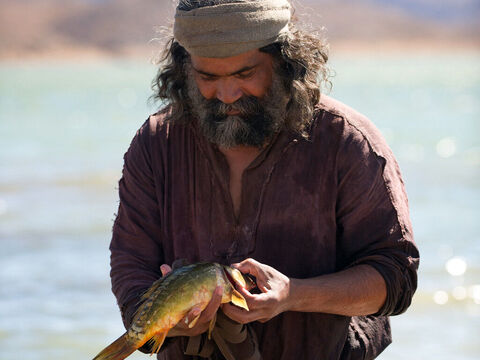

Found in Matthew 17:24-27, this miracle of Jesus is found only in Matthew and covers just 3 verses. Some have called this a minor miracle. That is a huge mistake. Those three verses are loaded with Revelation.
In the following paragraphs, you can learn about the coin carrying fish miracle, and find links to other free online resources based on this most unusual fishing trip. Scroll down for more information and links to sermons, stories, and entertaining sites for this miracle, and discover how money got in the mouth of a fish.

When they arrived in Capernaum, the collectors of the half shekel [the temple tax] went up to Peter and said, Does not your Teacher pay the half shekel?
He answered, Yes.
— Matthew 17:24 <AMP>
Jesus and His disciples arrived back in Capernaum. Peter had just confessed, “Thou art the Christ, the Son of the Living God.” (Matthew 16:16) This was a wonderful Revelation, that according to Jesus, was revealed to Peter by God Himself. And then, he was an eyewitness to Jesus’ Transfiguration. Even after receiving a tremendous Revelation, and witnessing the Glory of God, Peter stumbled into unbelief. Satan always comes to steal the Word. (Mark 4:15) Fulfilling the role of satan this time was a religious leader who asked Peter if Jesus paid the Temple Tax. Without even thinking, Peter said yes. He had just stated that Jesus was the Son of God, and therefore was exempt. This was a time Peter needed to control his tongue. At the very least, Peter should have deferred to Jesus, and let Him answer the question directly. Peter would later write, “Whoever would love life and see good days must keep their tongue from evil and their lips from deceitful speech.” (1 Peter 3:10)
The idea of controlling the mouth is a common theme in Scripture. Job is the poster child for what can happen if we don’t control what we think and say – “For the thing I greatly feared has come upon me, And what I dreaded has happened to me.” Eventually, Job learned to control his words. (Job 3:25-26, 6:24, Psalms 34:13, 141:3, Proverbs 10:19, 12:13-14, 15:1-2, 17:27-28, 21:23, Ephesians 4:29, Colossians 4:6)
And when he came home, Jesus spoke to him [about it] first, saying, What do you think, Simon? From whom do earthly rulers collect duties or tribute–from their own sons or from others not of their own family?
And when Peter said, From other people not of their own family, Jesus said to him, Then the sons are exempt.
— Matthew 17:25-26 <AMP>

Each year Jewish officials collected the Temple tax from every Jewish adult male. This half shekel (or double drachma) was paid at the beginning of the Hebrew month of Adar, preceding Passover. Shekels and half-shekels minted in Tyre were the only coins accepted as payment for the Temple Tribute. The Tyrian shekel was favored for its high silver content. Therefore, a whole industry of moneychangers was created to exchange foreign currency for the Tyrian shekel. These folks were notorious for overcharging folks and turning the Temple into a marketplace, instead of a House of Prayer. And this is why Jesus chased them out of the Temple. (Matthew 21:12-13, Mark 11:15-18, Luke 19:45-48, John 2:13-17)
Depending on the population estimates you choose, the Temple collected close to a million US dollars (in today’s money) every year. The funds were intended for Temple upkeep and salaries for the Temple personnel. Much of it did go to making the place gorgeous, as close to Heaven as could be created on Earth. But that amount of money, and the power invested in the High Priests by the people and Rome, resulted in great corruption at the top. This can be seen just in their desire to kill Jesus, and paying Judas to betray him. How was this a proper use of Temple funds? (Matthew 26:14-16) Jesus held nothing back when it came to the religious leaders. He called them hypocrites and blind guides. In fact, there is a whole chapter where Jesus criticizes the religious leaders. (Matthew 23:1-39)

However, in order not to give offense and cause them to stumble [that is, to cause them to judge unfavorably and unjustly] go down to the sea and throw in a hook. Take the first fish that comes up, and when you open its mouth you will find there a shekel. Take it and give it to them to pay the temple tax for Me and for yourself.
— Matthew 17:27 <AMP>
Peter’s word committed Jesus to pay the Tribute Tax. And Jesus would make sure it got paid because Peter’s reputation, and His, was on the line. Even though He was exempt, Jesus would pay to protect Peter, and keep the peace. But it is interesting. Judas was the treasurer. They kept a common purse for their needs. There was enough money flowing in and out that Judas was stealing from it. (John 12:5-6) So why did Jesus send Peter on this fishing trip? Peter had lack in his life. And the Word promises that The Lord is my Shepherd, I shall not lack. And The Lord gives you power to get wealth. (Deuteronomy 8:18, Psalm 23:1) Peter was about to get a live example of faith at work. Jesus gave him the Word. By leaving, Peter must have believed what he heard, since he did exactly what Jesus said. And in the end, everything happened exactly as Jesus promised. Peter believed the Word, and took that step of faith, with his spirit, mind, and body all in agreement. There was very little room for doubt or unbelief. (Matthew 17:20, 21:21, Mark 11:22-23)
But so that we don’t offend them, go to the lake and fish. Take the first fish that comes up, and when you open its mouth you will find a silver shekel (a four drachma) coin. Take that and give it to them for your Temple tax and mine.

Peter was a fisherman by trade. He knew everything a 1st century fisherman could know about fish. In the decades he had been fishing, he had never come across a fish with a coin in its mouth. Certainly, this was on his mind as he walked to the lake. But then again, during his first encounter with Jesus, he had gone all night without catching a single fish. Jesus borrowed his boat to preach, and then encouraged Peter to try once more. Following the Word, he tossed his net in the water and filled two boats with fish! (Luke 5:1-10)
Normally, Peter fished at night, in the deep, and from a boat using nets. Jesus had told him to “throw in a hook“. It sounds like basic cane pole fishing, but Jesus didn’t even mention bait! And it should also be noted that Jesus said the first fish that “came up“. Was it possible that the fish would just come to Peter once he put the hook in the water? Maybe similar to what Elisha experienced with the floating ax head? (2 Kings 6:1-7) The only other possibility is a technique that is called today, snagging. A weighted line has multiple hooks, often treble hooks these days, and is dipped in the water. With a swift jerking motion, you pull the line up, hopefully snagging a fish on one of the hooks. The notes in Bullinger’s Companion Bible suggest this was what was intended by the text, and that the practice continued into his day, which was the start of the 20th century. The technique ultimately does not matter. Peter heard the Word from Jesus, was obedient, and had his need met – a stater, a coin sufficient to pay the Temple Tribute for both Peter and Jesus.
“The miraculous manner in which the Lord paid once more repeats the story of His death and resurrection. “Go to the sea, and cast an hook, and take up the fish that first cometh up; and when thou hast opened his mouth, thou shalt find a piece of money.” The depth of the sea speaks to us of the depth of suffering to which our Saviour went at Calvary, when all God’s waves and billows rolled over Him. But He arose, for note carefully that Peter was not told to open the mouth of the first fish he caught, but of the fish that “cometh up.” The fish came to the surface of its own accord voluntarily, even as our blessed Lord rose from the dead by His own power. In its mouth was the price of the tribute money; even as when Christ arose, He opened His mouth and declared that the work of redemption had been accomplished, telling His disciples to go and preach that message to all the world. We have a message—a piece of money—to pay every debt; it is the price Jesus paid for the salvation of mankind. May we carry it everywhere, and in some measure pay the debt we owe to Him and which we owe to man as well (Romans 1:14)
— August Van Ryn, Meditations In Matthew
The Jewish religious leaders were continually seeking ways to accuse Jesus. They were jealous of his popularity and afraid that they would lose their power, wealth, and status. They preferred the praise of men over a personal relationship with God. When the officials in Capernaum asked Peter if Jesus paid the Temple tax, this may have not been a direct attack, but had Peter said no, or Jesus refused publicly to pay the Temple Tribute, it certainly would have given the religious even more reasons to attack Jesus. That Tribute was the source of their wealth, and they could not have anyone defy their power, especially publicly. Imagine the outrage if several hundred Jewish males decided to follow Jesus and refuse to pay?
Jesus understood this completely. It was a small matter to provide the Tribute money, protect Peter’s integrity, and keep the peace for a little longer. And Peter, even though it involved a little work, learned a valuable lesson on faith, and God’s willingness to provide everything we need – even before we ask. (Matthew 6:7-8, Luke 12:29-31)
When Jesus told Peter what to do and Peter acted on Jesus’ words, their faith activated the spiritual realm. Birds and mammals often pick up shiny things left by humans. Fish will often bite anything that flickers in the light. And there is no reason to doubt that when God commands an animal to do something, unlike humans, they obey instantly. Its interesting that Jesus said the first fish that came up from the deep. I have often wondered if there were many fish scrambling to get to Peter. Who knows what he would have retrieved from the 3rd, 4th, and 5th fish? I’m speculating, but then again our God is MORE THAN ENOUGH. (Genesis 15:1, Deuteronomy 28:1-14, Psalm 23:5, Proverbs 3:9-10, John 10:10, 2 Corinthians 9:8)
God had to make everything happen just as Jesus had said. Only God could have known where a coin was in the Sea of Galilee that would be the exact amount of tax owed. And only God could have commanded a fish that would be ready to retrieve it and deliver to Peter. God miraculously supplied Peter’s needs and He will supply everything you need as well. All He is waiting on is for you to have the faith to believe He will do what He says He will. (Proverbs 3:1-35)
Coin Carrying Fish – Matthew 17:24-27
Check out all the wonderful Christian content linked below and learn more about this miracle.
Children’s Bible Stories – Scriptures and Adaptations on the Fish With a Coin In Its Mouth Story
Peter and the Tribute-Money – A very brief easy-to-read version of the miracle story
Children’s Stories – Original Fiction Based on the Miracle Coin From the Fish Story
Tasha, the Catch Of the Day – An Animal Parable based on the Gospel account of Peter catching a fish with a coin in its mouth. Companion lesson.
Children’s Activities, Crafts, Coloring Pages, Music & Poetry for the Coin Carrying Fish Miracle
Fish Crafts – Scroll down to the middle of the page.
Children’s Sermons & Lessons on the Fish With a Coin In Its Mouth Miracle
Jesus & the IRS – A children’s lesson from Matthew 17:24-27
Why Did Jesus Pay Taxes With a Coin From the Mouth of a Fish? – A short lesson
Devotions, Discussions & Sermons and Other Resources About Jesus Paying the Temple Tax With a Coin From the Mouth of a Fish
The Coin in the Fish’s Mouth – A nice summary on Peter getting the coin from the fish’s mouth
The Miracle of Christ: The Coin In The Fish’s Mouth – A Bible study on Matthew 17:24-27
The Temple Tax – A scripture study based on Matthew 17:22-27
The Coin In the Fish – An interesting and short perspective on the miracle
Was Jesus Christ Tax Exempt? – Focuses on the lessons on paying taxes
The Tribute Money – A secular article on the Fresco painted by Masaccio
Jesus’ Action In The Temple And Evidence Of Corruption In The First-Century Temple – An academic paper
The Temple Tax Coin In The Time Of Jesus – The Tyrian Shekel and the Temple
Capernaum – Information and pictures on Peter’s hometown
Capernaum– A good summary of Capernaum’s role in Jesus’ ministry
Image Source: www.LumoProject.com
NOTES
Search for Other Christian Web Sites.
Suggested Search Terms: Peter, Miracles of Jesus, God’s abundance, Temple Tax, Matthew 17, fishing, stater, shekel, Coin in the Mouth of a Fish
Thank you for a really thorough and well rounded approach to this miracle of Jesus